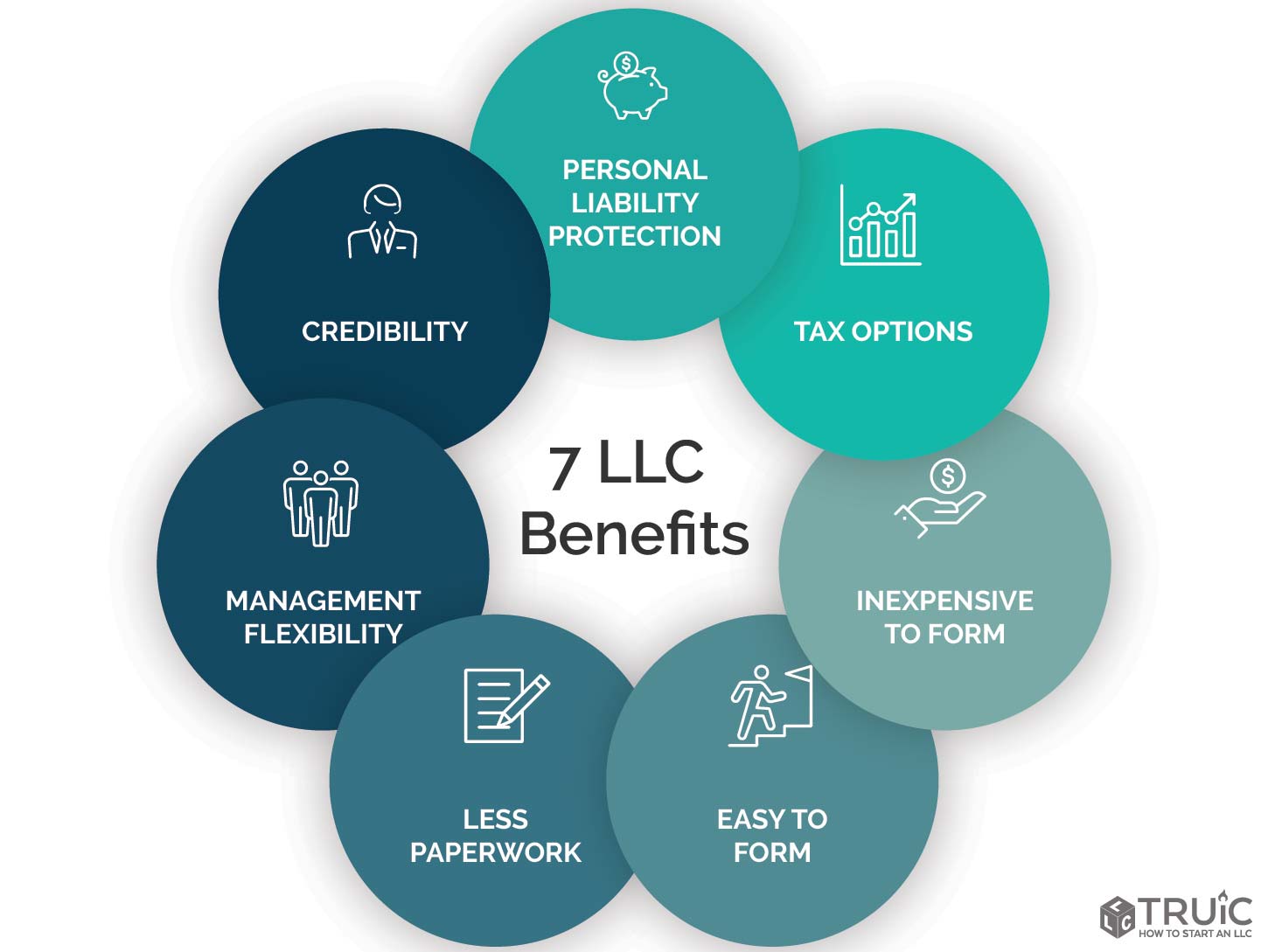7 Benefits of Starting an LLC
The main benefits of an LLC are liability protection, credibility, tax flexibility, and easy startup.
Ultimately, creating a limited liability company (LLC) will help safeguard your personal assets and help you grow your business.
Small business owners prefer LLCs because they’re relatively inexpensive and easy to manage.
We’ll go over all of the other benefits of an LLC below.
Form Your LLC for Just $29 + State Fees:
Northwest Registered Agent. Expert LLC formation, privacy protection, and they will keep track of your documents

The 7 Benefits of an LLC
Limited liability companies (LLCs) are usually the best business structure for small businesses. Here are the main benefits of an LLC:
1. Personal Liability Protection
The main advantage of LLCs is that they provide members with personal liability protection. This means that an owner’s personal financial assets aren’t in danger if the LLC goes into debt or is sued.
Sole proprietorships and general partnerships don’t offer this protection. Any business that carries even the lowest amount of risk should form an LLC.
Keep in mind that owners can lose liability protection if they do something to pierce the LLC’s corporate veil. This includes things like mixing personal finance accounts with business accounts and committing fraud.
Related: Charging Order
A related advantage of an LLC is the charging order. If one member has issues that could impact the LLC, the charging order will protect the earnings and ownership stakes of the other members and also allow the indebted member to continue their role in the company without giving the creditor any power to run the business.
2. Tax Options
LLCs are subject to “pass-through taxation” by default, which means the LLC’s profits and losses pass through to each member’s individual tax return and are taxed at the owner’s personal tax rate. As a pass-through entity, the LLC doesn’t have to pay any federal corporate income tax. This means that the owners can avoid double taxation, which is not the case for owners of corporations.
LLCs also have the option to be taxed as either a C corporation (C corp) or an S corporation (S corp), which may be beneficial, depending on a few factors.
3. Inexpensive to Form
LLCs are generally inexpensive to form and maintain. The main cost of forming a limited liability company (LLC) is the state filing fee. This fee ranges by state.
Recommended: Visit our LLC Cost guide to learn more about LLC costs in your state.
4. Easy to Form
Compared to C corps and S corps, LLCs are very easy to start. You should be able to form an LLC on your own without the help of an attorney.
If you don’t feel comfortable going through the process yourself and would like professional help, we’ve put together a list of the best LLC services.
Starting an LLC yourself is easy. Select your state for detailed steps:
- Alabama LLC
- Alaska LLC
- Arizona LLC
- Arkansas LLC
- California LLC
- Colorado LLC
- Connecticut LLC
- Delaware LLC
- Florida LLC
- Georgia LLC
- Hawaii LLC
- Idaho LLC
- Illinois LLC
- Indiana LLC
- Iowa LLC
- Kansas LLC
- Kentucky LLC
- Louisiana LLC
- Maine LLC
- Maryland LLC
- Massachusetts LLC
- Michigan LLC
- Minnesota LLC
- Mississippi LLC
- Missouri LLC
- Montana LLC
- Nebraska LLC
- Nevada LLC
- New Hampshire LLC
- New Jersey LLC
- New Mexico LLC
- New York LLC
- North Carolina LLC
- North Dakota LLC
- Ohio LLC
- Oklahoma LLC
- Oregon LLC
- Pennsylvania LLC
- Rhode Island LLC
- South Carolina LLC
- South Dakota LLC
- Tennessee LLC
- Texas LLC
- Utah LLC
- Vermont LLC
- Virginia LLC
- Washington LLC
- Washington D.C. LLC
- West Virginia LLC
- Wisconsin LLC
- Wyoming LLC
5. Less Paperwork
Corporations are more regulated than LLCs and have considerably more paperwork. LLCs are not required to have a board of directors, keep meeting minutes, or hold shareholder meetings. This means much less time and money spent on keeping records and filing compliance-related documents.
Small business owners should only form a corporation vs LLC if they need to attract investors.
6. Management Flexibility
LLCs can decide between member-managed vs. manager-managed structures. Member managed means that the members are actively involved in managing the company’s operations. In a manager-managed LLC, the members delegate the responsibility of managing the company to a manager, who may or may not be a member. In this case, some, or all, members may act more as passive investors. LLCs also aren’t required to have a board of directors which allows management to be more independent.
7. Credibility
Forming an LLC is a step up in credibility from a sole proprietorship or partnership. Customers and other businesses will find an LLC more credible, and starting an LLC can show people that you are taking your business seriously.
Ready to Form an LLC?
Start an LLC yourself using our free Form an LLC guides or hire an LLC formation service for a very small fee.
LLC Benefits FAQs
LLC members get paid differently, depending on the LLC’s tax structure. Read our How Do I Pay Myself From My LLC? article for more information.
Some of the benefits of an LLC include personal liability protection, tax flexibility, an easy startup process, less compliance paperwork, management flexibility, distribution flexibility, few ownership restrictions, charging orders, and the credibility they can give a business.
Learn more here: LLC Benefits guide and Single-Member LLC guide.
LLCs are better for taxes for some businesses but not for all. Read our LLC Tax Guide for more information.
LLCs and sole proprietorships have the same default tax structure. However, LLCs are also eligible to elect S Corp tax status, which could potentially result in them paying fewer taxes than a sole proprietorship, depending on the situation.
Learn more here: LLC vs Sole Proprietorship guide.
You don’t need an LLC if self-employed, but we recommend forming an LLC over a sole proprietorship because of the advantages that LLCs offer.
Learn more here: LLC vs Sole Proprietorship guide.
An LLC owner must pay Federal Insurance Contributions Act (FICA) self-employment taxes on their owner’s draw or distribution.
Learn more here: How to Pay Yourself From an LLC guide.
You can easily create an LLC yourself by using our free How to Form an LLC guide, or you can use an LLC formation service to register your LLC for you.
The main cost of forming an LLC is the state registration fee, which is between $40 and $500, depending on the state. If you decide to use a professional service to help with the formation process, there will be added expense.
LLCs are taxed differently depending on their structure. Taxation depends on if you operate a single-member or multi-member LLC as well as your LLC tax structure.
Read our LLC Tax Guide for more information.
Pass-through taxation is a system of taxation that generally applies to sole proprietorships, partnerships, LLCs, and S corps. In this system, the profits or losses of the business are not taxed at the business level. Instead, they pass through to the owners’ personal tax returns and are taxed at each owners’ personal income tax rate.
Read our LLC Tax guide for more information.
You should form your LLC in the state where it’s located or conducts business. While certain states may have more business-friendly laws and policies, it becomes more complicated if the business is not actually located there.
Visit our Best State to Form an LLC guide to learn more.
You typically don’t need a lawyer to form an LLC. You can easily create an LLC yourself by using our free How to Form an LLC guide, or you can use an LLC formation service to register your LLC for you.
Your business’s unique situation and needs will determine whether it’s better to form an LLC or a DBA company. A DBA is a doing business as name and many sole proprietors choose to use a DBA name. In an LLC, you won’t need a DBA because LLC formation registers your legal name with the state.
Read our DBA vs. LLC guide for more information.


